Heaven help the people tasked with creating the corporate response to a nationwide uprising against the systematic murder of black people by police.
People are on the march everywhere, and our Brands are very eager to let you know that they are on, well, some kind of march too. From L’Oreal, to Grindr, to every goddamn Disney property, companies are sharing messages about coming “together” to “stand” and “speak out” for black people. There haven’t been that many messages about why black people need solidarity, or what they’re speaking out for, or against, or why they have something to say at this moment in time. But the brands are definitely sharing words.
It comes down to, “we’re a Good Company and we believe black people should be able to… well, you know, so why bother telling you!”
Some have had stronger, or at least more apologetic, messaging than others — Grindr, for instance, announced it was removing its racist “ethnicity filter” from its app (after years of criticism, lol) — but they are all, overall, the same. Nearly every single one contains graphics of white words with a white logo on a black background (or in some cases, no logo at all! Hmm!) that attempt to evoke some feeling of “thoughtfulness” and “oneness,” or something.
It’s unclear where this “racial harmony” message design came from. I spoke to a few of my friends in marketing and advertising who think that a few brands might have dictated this white-on-black design, and others followed their lead. Another friend thought that the no-frills graphics would make them less likely to get singled out for shitting the bed in their police brutality responses.

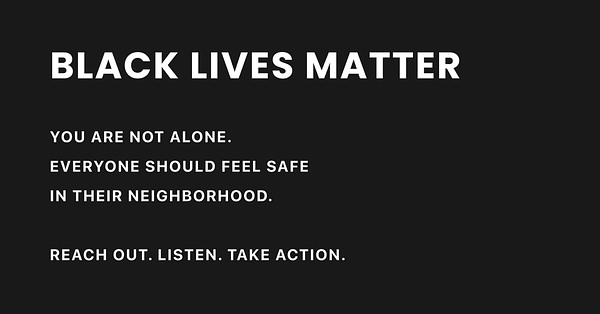
(Yes, this is a Garfield-themed restaurant tweeting a Black Lives Matter hashtag.)
And variations on a theme:
The party continues on a Twitter thread by Gene Demby, a co-host of NPR’s Code Switch podcast, who’s collected a series of bad brand messages about racism, and diversity, and other related non-specific buzzwords.
Alas, I am astonished that, as one of those marketing friends pointed out, an ad department can use so many words on a design with such visual focus on message but still somehow say very little.
Noticeably, companies say they’re fighting “racism, justice, and inequity,” not white supremacy and militarized police. They won’t stand against the life-threatening force being used by police on black people, or black protesters.
There is a clear disconnect between what is happening in this moment — a massive uprising in response to decades of unchecked police violence and murders of black people, set off by the police murder of George Floyd last week — and what is being communicated by these brands. It’s not enough to say you want to end racism if you’re not willing to name the systems killing black people as a result of that racism.
In several cases, companies reference the Black Lives Matter movement and, implicitly, the nationwide rebellions in order to misrepresent their historical lack of commitment to protecting black people from white supremacist violence.
Take this ad from L’Oreal, with the tagline, “Speaking out is worth it.”

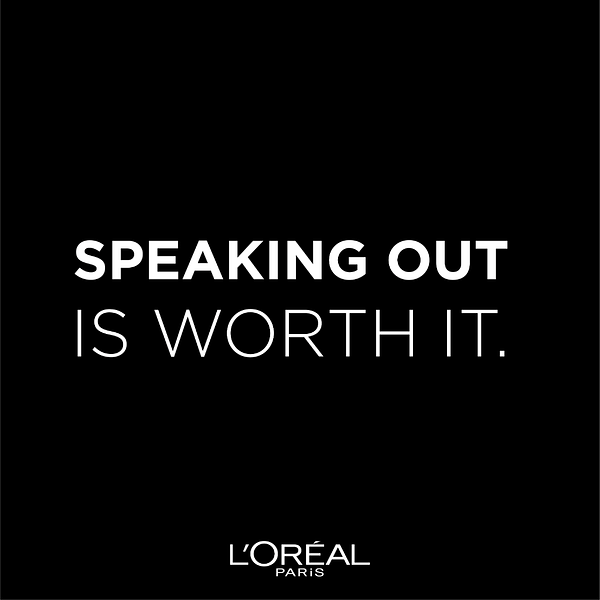
In 2017, L’Oreal fired black transgender model Munroe Bergdorf, the company’s first trans model to be featured in a UK campaign, after she correctly called called out white people for being agents of white supremacy after the deadly rally in Charlottesville.
And then there are companies like Amazon and NextDoor, seen in tweets featured above. Amazon sells facial recognition software to cops, thus actively participating in racial profiling and targeting. Its home security company Ring has hundreds of partnerships with police departments, allowing them to request access to doorbell footage captured by users’ Ring cameras. Its accompanying social media crime-reporting app, Neighbors, has, like NextDoor, given racist suburban neighborhood watch wannabes a place to thrive.
And in April, Amazon’s general counsel was caught using racist language in a plan to delegitimize worker organizing at their Staten Island warehouse, and smear the organizing leader Christian Smalls, a black man who they fired as a result.
Give me a fucking break.
In case you’re thinking of giving other companies the benefit of the doubt, they mostly don’t deserve it:
Star Wars’ Twitter account didn’t include any information on what Disney’s commitments might be.
Grindr is hosting an online fundraiser for nonprofit the Bail Project, but there’s no mention of whether they’re contributing money themselves.
Spotify said that it would add 8 minutes and 46 seconds of silence — the amount of time Officer Derek Chauvin had his knee on George Floyd’s neck — to select playlists. It also promoted a Black Lives Matter playlist.
Hootsuite tweeted that it is making a “monetary donation” and giving its software to organizations “committed to battling racism.”
Square said it’ll do “real meaningful work” with its Black Squares Association employee resource group, with no specifics mentioned.
Nike’s Twitter and press center make no mention of its commitments.
L’Oreal says it’s making a “commitment” to the NAACP, but there are no specifics beyond that.
This “image is worth a thousand words” facade has extended to the social media efforts of the music industry and everyday people. On Monday, entertainment executives, artists, and agencies pledged to participate in something called #TheShowMustBePaused.
To be clear, the event’s intention sounds thoughtful: Jamila Thomas, Atlantic Records senior director of marketing, and Brianna Agyemang, a former Atlantic executive, wrote that they wanted to disrupt an industry that has profited predominantly off of black art. They encouraged black people in the industry to take time for their mental health, and white people to have difficult conversations with their family and peers. At the bottom of their website, they included a list of action items and educational resources.
The music industry, and for some reason many white people, have instead taken this as a sign that they should take the day off to think about racism and maybe vent about “everything that’s going on.” Social media posts with the hashtags #TheShowMustBePaused, #BlackLivesMatter, and #BlackoutTuesday — a similar effort by large companies that encourages content creators to abstain from posting their content — are flooding Twitter and Instagram.


Yes, that’s Tiffany Trump. I know.
The consequence? These feeds are now flooded with blackout images that contain no information about the day’s protests, or organizations seeking bail funds or other donations, or about how people can be better allies, or on the recent murders and near-lethal assaults on protesters, black people, and people of color. And while influential people are abstaining from posting content, they’re also largely not telling their followers how they can contribute to the fight for black people and against white supremacy.
Great fucking job. White people are literally begging black people for the answers to how they can “solve racism,” and even when given an opportunity and direction to resources, they still manage to fuck that up.
It’s not even clear what entities participating in #TheShowMustBePaused are doing to engage their staff on the company’s role in perpetuating white supremacy or help their black staff grieve. According to Vanity Fair, Def Jam said, “Many of us are donating our day’s wages to the organization of our choice on the front lines of this fight,” which is not the same thing as a donation from the company. Bandcamp said it will make an annual donation to the NAACP Legal Defense Fund every Juneteenth (lol jfc).
Their internal efforts are struggling, too. A friend of mine who does PR in the music industry (and who wished to remain anonymous for obvious reasons) told me that their bosses gave employees vague instructions on how they could request the day off, instead of just giving everyone time off automatically. It’s almost an assurance that people who need the time off amid the trauma they’re experiencing won’t take it.
These vapid brand messages and social media blackout posts are two prongs of the same directionless call to action. Words can be nice. They can make people feel better, or bring them to tears or anger, or give them relief, or hope. But they can also signal solidarity without committing to it, and that’s why they’ll never be enough.
I feel bad for the well-meaning white people who thought their company was somehow better than this, even if I think some of them had to be fucking clueless to think their bosses cared about marginalized people in the first place. There is something disgusting but simultaneously liberating about realizing that the people you work for don’t actually give a shit at all. You begin to feel like this place fucking reeks, and you wouldn’t mind fighting them and risking it all.
If you’re a white employee of one of these companies and you’re wondering how to help, then I selfishly invite you to learn and tell your coworkers about an example of why the police must be abolished, or at the very least demilitarized and defunded.
Here’s one from me. I live in Austin, and on Sunday police shot one underage teenager and one 20-year-old with bags of lead pellets in the head. Both people were shot in separate incidents while protesting, were black or a person of color, and were severely injured. The teenager underwent a seven-hour surgery. The 20 year old is still in critical condition. In another incident, a pregnant woman was rushed to the hospital after Austin cops shot her in the stomach.
“I was being safe[,] my peaceful protest was safe[,] it was the police who made it an unsafe environment for me and for my fetus,” the woman, who has identified herself on Twitter, shared online. “I was not hurt by protesters I was hurt by the police so if I can't peacefully protest and be safe well what can I do?”
We need to know about these things. We need to be in the streets if we can. We need to give our money away. That’s what will help. We don’t need these brands. They can sit this one out.
Image by Samantha Grasso.


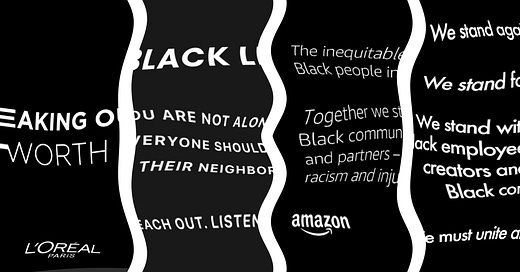




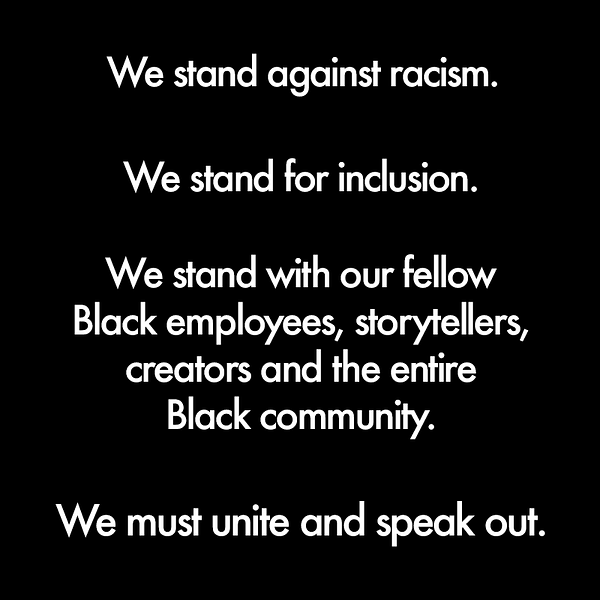

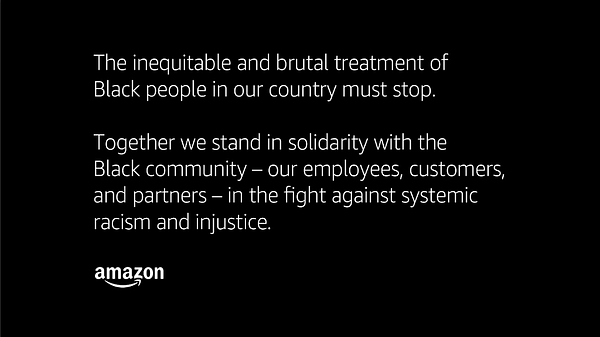

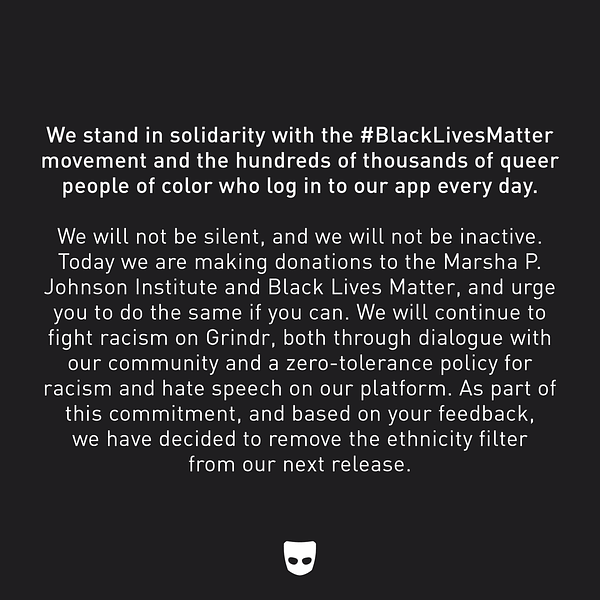

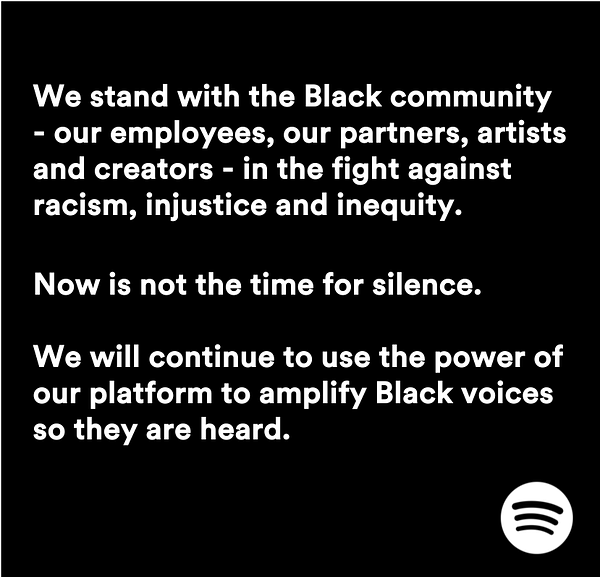

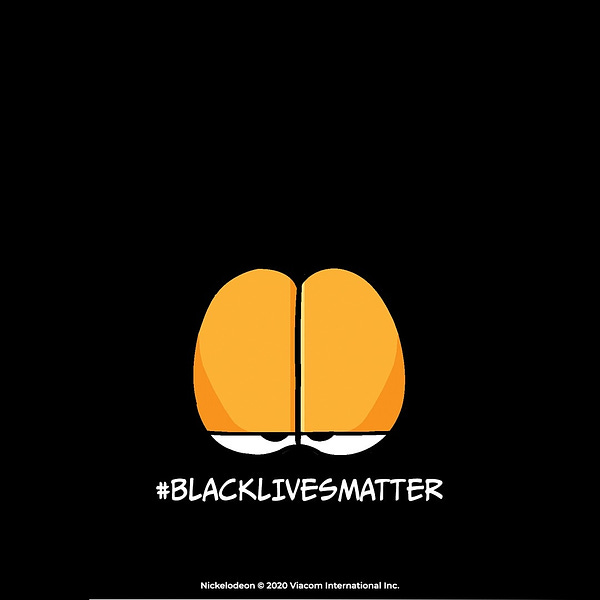

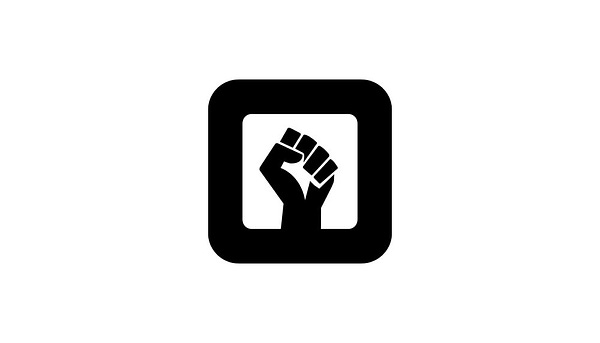



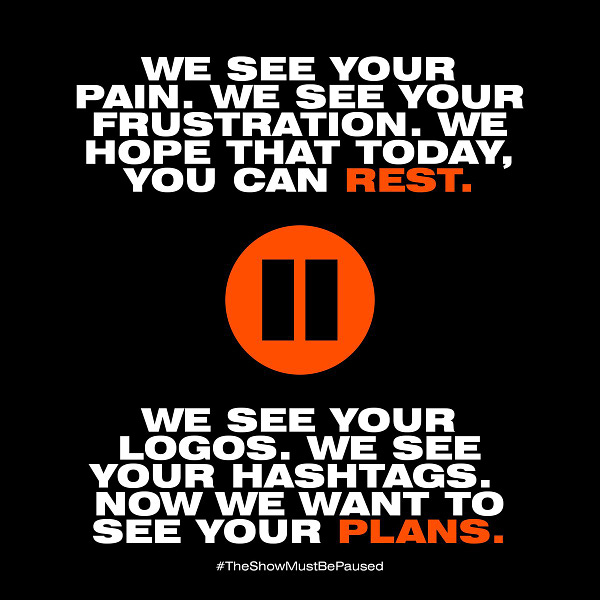

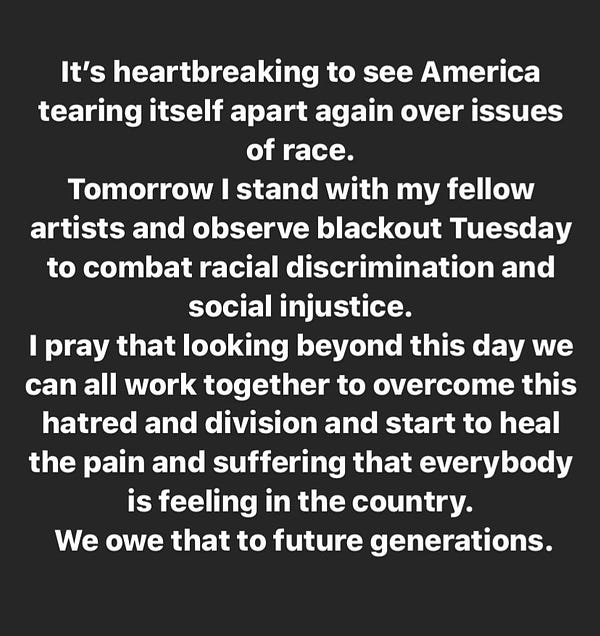

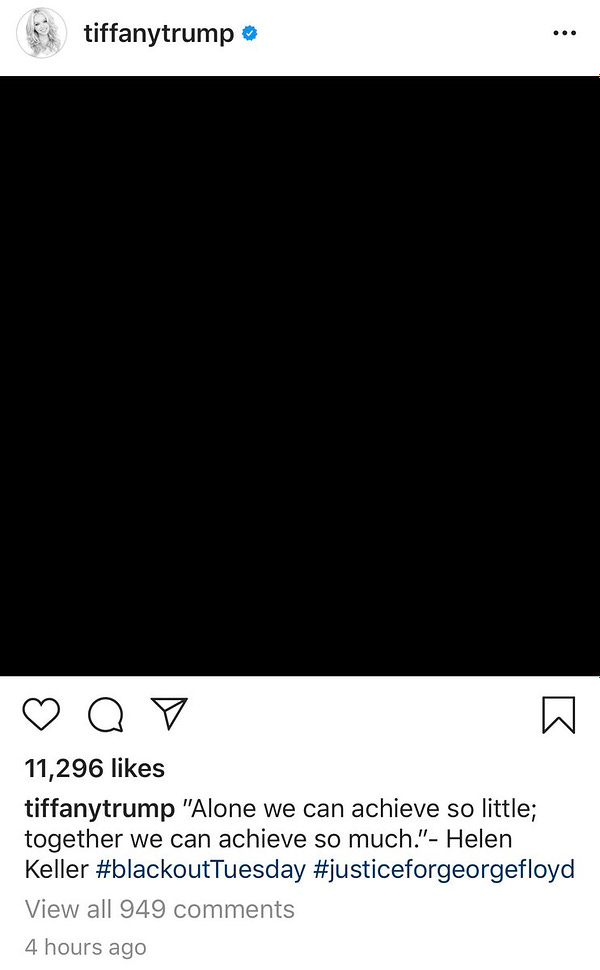
absolutely marvelous. https://twitter.com/Redskins/status/1267918269798850563
There are a lot of issues I have with this piece, but the biggest is what you said about L'Oreal. They did not fire Bergdorf in the way you stated. She posted on Twitter that "ALL" white people are racist, and L'Oreal fired her, stating that they believe in embracing diversity. Go back and read the actual statements from both parties involved. Your article is incredibly biased and does a disservice both to BLM and to some of these companies who are genuinely trying to help.